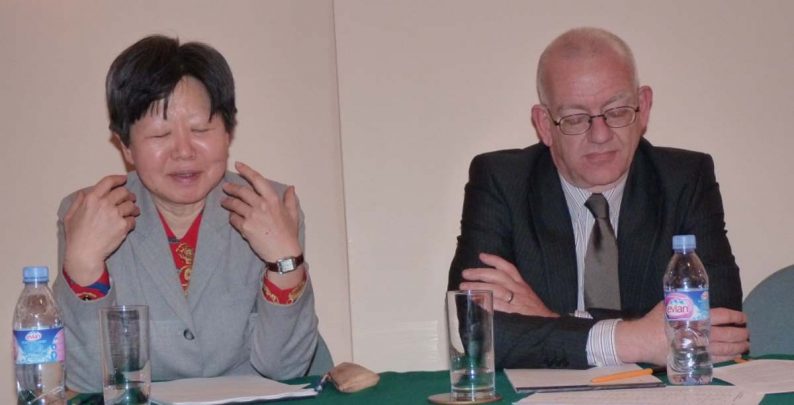 Seminar Series 2011
Seminar Series 2011Wednesday 2 March 2011
6:00pm – 7:00pm
What the State Provides: Social Security and the Welfare State
Drinks reception from 8:00pm
Daiwa Foundation Japan House
Organised by the Daiwa Anglo-Japanese Foundation
This second seminar in the 2011 series, Uncertain Futures: The Individual, Society and the State in the UK and Japan, explored the concepts and issues surrounding social security and welfare provision in the UK and Japan. The speakers considered current arrangements in both countries in the context of longstanding debates on trust and responsibility and what the State should provide to support social needs. From the Beveridge Report to the ‘Big Society’, the evolution of the welfare state and the impact of spending reviews on social policy in the UK were assessed. Our Japanese speaker drew upon recent research to compare ‘livelihood security systems’ and explored future possibilities for a society of social inclusion in Japan.
Summary
The first speaker, Stephen Davies, in approaching the topic of what the state provides acknowledged that the welfare state is facing many challenges in the OECD countries; these are not existential, he went on to say, and they are not just as a result of economic crises but from the intensification of structural systems and the incompatibility of goals and purposes.
The British welfare state, explained Davies, is the product of a long period of historic evolution comprising three distinct stages: the extremely old, harking back to the Renaissance; the more recent dating back to the early twentieth century and the most recent, also the most problematic, dating back 30 or 40 years.
During the middle ages welfare, largely promoted by the Church through alms-giving, helped prevent and alleviate utter destitution. Following this, a considerable amount of legislation was introduced in the second half of the sixteenth century to supplement family, mutual aid, philanthropy and voluntary association activity; the Elizabethan Poor Law was introduced in 1603 and persisted until the 1940s with major reform in 1834. In its inception it mandated that each parish was responsible for maintaining the poor, leading to the creation of workhouses where the poor learned to support themselves.
The problem of the aged poor and the unemployed, highlighted by workhouses overwhelmingly full of decrepit elderly with no income led to the introduction of social protection measures, based on Bismarck’s Germany as a model, at the end of the 19th century and the beginning of the 20th. A move away from the Poor Law towards a state system ensued.
The concept of unemployment was formulated in the 1890s and though a lot was done by mutual aid societies this was inadequate. Lloyd George’s People’s Budget, with the aim of taxing the rich to help the poor, was introduced in 1909/1910 and legislated for unemployment compensation and health and disability insurance amongst others. The Beveridge Report in 1942 saw a big expansion of state provision though limited in that, assuming full employment, it did not cover the unemployed and made varied gender assumptions, e.g. that work for women was an incidental part of their lives. To the extent that women received money due to the amount they worked, said Davies, it was very little.
Social assistance was brought about by two problems – the working poor (there was no real provision for those on a very low wage) and rent/housing costs. Due to enormous variations in costs, the delivery of housing relief was far from straightforward and even now is problematic in that it acts as a subsidy to private landlords, helping stoke property prices. National assistance – a way of topping up the salary of the lowest – was also introduced and evolved into supplementary income support /family income support – the name and format of this particular benefit changed regularly and the idea was that it would be eventually phased out. The aim of the overall system was to relieve poverty in a wider sense and to minimise income differentials
In fiscal terms the British state faces long-term problems quite apart from the current financial crisis. The major issues are cost and sustainability, effectiveness, goals, justification, gender and generational justice – the latter being most acute in the case of pensions.
Various proposals have been suggested to deal with these problems, said Davies, including BIG, a radical consolidation of all benefits into one package; the ‘Big Society’ which involves handing over large areas of state funding not to private charities but to revived friendly societies, and reverting back to Beveridge. The latter, meaning the privatisation of a large part of the welfare society and an end to housing benefit and family income support, is the solution likely to go forward as it is most in tune with the British voting public. The last option is radical universalism which is politically unlikely and which approach results in hostility with the perception of national propriety in welfare.
In concluding the 100-year story of welfare in the UK, Davies reiterated that there have been periodic revisions – in the 1830s, 1900s and 1940s – and that another one looks likely now. In about ten years the welfare system will be quite different to what we have now though it is hard to predict how it will evolve.
The second speaker, Professor Mari Osawa talked about challenges to livelihood from a gender perspective and began by saying that Japan had been hard hit by the social and economic crisis, despite being far from its epicentre, because of its export-oriented dependence centred on IT and auto goods.
To overcome its present condition, continued Osawa, Japan needs to depart from its current socio-economic structure and to base its growth on domestic demand and revitalised household consumption. This will require reducing the proportion of relatively poor people, the second highest among major countries after the USA.
Providing context, Osawa said that of the major economies, only Japan has been suffering form deflation these past ten years. In the late 1980s private consumption contributed 50% to GPD whereas now it is 40 or even 20%. There was a brief, 16-month recovery from 2002 but real employee income never increased. 70% of the women employed in Japan have attained higher education qualifications. In April 2009 the Council on Economy and Pubic Finance in Japan (during the LDP administration) admitted that income disparity had been gradually growing since the 1980s.
Among poor households in Japan with working age heads of household, 39% have two or more working members compared to 17.3% who have none in work; the OECD average is, respectively, 17% and 37.3%. The earning power of women in Japan is hopelessly low and the casualisation of employment in Japan has also had an impact on employee security and wages.
Analysing the accomplishments of tax and social policies in Japan, Osawa stated they have had little impact and that the effectiveness of the tax system in mitigating income disparity has been declining. Japan is usually regarded as having more protection against layoffs of regular workers but this hasn’t been the case and especially so since the deregulation of temporary employment in a move close to the Anglo-Saxon model espoused by the UK, Australia, New Zealand and Canada. Japan’s income tax is often misperceived as being progressive whereas, in fact, it has been declining since 1989 as a result of various tax reforms.
Looking at the global imbalance as the cause of the economic crisis, Osawa posited that over-consumption and forced spending in medicine due to the lack of universal health insurance were the main causes of the USA’s trade deficits. Factors such as over-saving in trade surplus countries such as Chine and Japan in particular exacerbated the problem. People in these countries were forced to save, however, because of the unreliable social security system in their countries.
In concluding, Osawa stated that a more equitable life security system is indispensable for a more stable global economy as are sustainable societies which provide for the less privileged, notably women. In essence market-oriented models are not cheap and the Scandinavian life balance system is, conversely, not so expensive. Universal medical security in the USA would reduce the world’s highest medical costs while simultaneously improving people’s health and their financial situation, while the enhancement of women’s earning power in Japan would result in a more credible pension scheme and longterm security.
The lively questions and comments following the talks covered a range of issues including Japanese attitudes to supporting the poor and the fact that the Japanese, would on the whole, pay more tax if it meant better welfare; the fact that the poverty rate of the retired population at, over 20% (50% are women), is higher than that of the working age population (14%); that the stigma attached to public assistance in Japan means the take-up rate is 30% (50% in the UK) though contributory entitlements are seen as a right; the possibility that the Big Society won’t deliver; the extent to which the welfare state has contributed to inequality and created sever poverty traps in the UK illustrated by the striking number of households made up of people who don’t work whereas in Japan you find poor households despite both household heads working; and that the Japanese government is looking at restoring progressivity and revenue-raising.
About the contributors

Professor Mari Osawa
Mari Osawa is Professor and Doctor of Economics at the Institute of Social Science, University of Tokyo. She is also Leader of the ISS institute-wide Joint Research Project on “Governance re-examined”, Member of the Science Council of Japan, Director of the Economic Policy Institute for Quality of Life and Vice Chair of the Expert Committee for the Government Tax Commission. She specializes in comparative gender analysis of social policies. She has worked as visiting professor at the Ruhr-University of Bochum and Gender and Development Studies Program of the Asian Institute of Technology, as well as a Fellow of the Hanse-Wissenschaftskolleg. Her English publications include: Walby, S., H. Gottfried, K. Gottschall and Mari Osawa (eds) Gendering the Knowledge Economy, Comparative Perspectives (Palgrave Macmillan, 2007), Tsujimura, Miyoko and Mari Osawa (eds) Gender Equality in Multicultural Societies: Gender, Diversity, and Conviviality in the Age of Globalization (Tohoku University Press, 2010). Her new book, Social Security in Contemporary Japan (Routledge/University of Tokyo Series) will be published in May 2011.

Dr Stephen Davies
Stephen Davies is Education Director at the IEA. Previously he was Program Officer at the Institute for Humane Studies (IHS) at George Mason University in Virginia. Before joining IHS, he was Senior Lecturer in the Department of History and Economic History at
Manchester Metropolitan University. He has also been a Visiting Scholar at the Social Philosophy and Policy Center at Bowling Green State University, Ohio. A historian, he graduated from St Andrews University in Scotland in 1976 and gained his PhD from the same
institution in 1984. His academic and research interests include the history of crime and criminal justice, history of ideas and political thought, comparative economic history, and the history of the private supply of public goods. He has authored several books, including
Empiricism and History (Palgrave Macmillan, 2003) and was co-editor with Nigel Ashford of The Dictionary of Conservative and Libertarian Thought (Routledge, 1991).

Dr Peter Kenway
Peter Kenway is Director of the New Policy Institute, an independent think tank and consultancy set up in 1996 to promote evidencebased
analysis of social problems both in the UK and abroad. NPI’s annual Monitoring Poverty and Social Exclusion report, published since
1998 by the Joseph Rowntree Foundation, is widely recognised as the most authoritative independent assessment of the progress being
made in these matters. A professional economist, he has written extensively on the tax and benefit system, the role of markets in providing essential services, and the reform of local government finance. He is a member of the Welsh Assembly Government’s Ministerial Advisory Group on child poverty. Reflecting his long standing interest in the economies of eastern Europe, he is a Visiting Fellow at the University of Reading’s Centre for Euro-Asia Studies. His 1994 From Keynesianism to Monetarism is about to be republished as part of the Routledge ‘revivals’ series. As a senior manager within London Transport in the 1980s, he played a leading role in the early privatisation of the capital’s bus services.